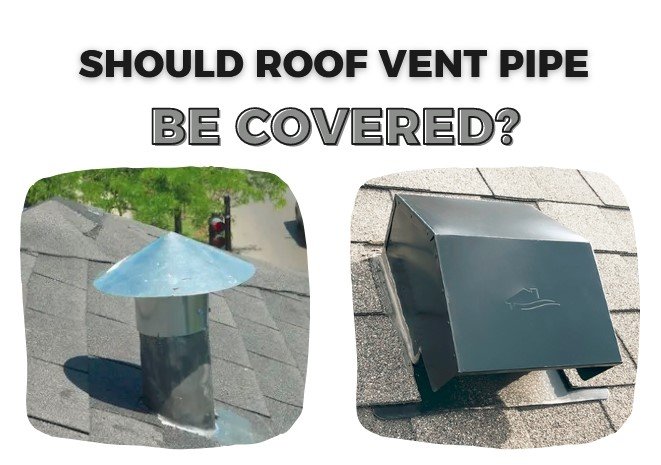Many homeowners may wonder if the plumbing vent pipe, a crucial component of their home’s infrastructure, should be covered. Not many homeowners understand the correlation between the roof vent pipe and the house’s proper maintenance and care.
There are certain details that you may not be familiar with. So, if you aren’t familiar with these details, read on.
Install Vent Pipe Through the Roof
You should know that many roof vent pipes, similar to an HVAC vent stack, are a part of the house’s plumbing system. It also means that it’s related (and connected) to the water systems. Because it’s part of the plumbing system, it is likely wet most of the time.
The arrangement can vary depending on the roof type and the house’s specific design. Some homeowners may cover the vent pipes, while others don’t.

Read also: How to Unclog Vent Pipe on Roof and Detecting The Issues
Should Roof Vent Pipe be Covered?
Many homeowners feel the need and importance of covering the pipes. But if they decide to cover it (by using the roof vent cap), It’s not just about preventing rain from entering the pipe, but also about protecting it from debris and animal infiltration using a vent cap cover.
When there are storms, the possibility of debris getting into the vent pipe is big. Not to mention that there are animals that may climb into the pipes. So, it would be a good idea to cover the vent pipe with a cap to ensure it is working properly and to protect the pipe’s integrity and condition.
Knowing More about Vent Boot
The boot, or the vent pipe cover, is the rubber cover for the vent pipe. The boot, or a small vent box, would seal the surrounding area of the pipe while protecting it from dirt and water. These boots can naturally contract and expand, adjusting with the fall and rise of the temperatures and maintaining the air pressure in the vent system.
However, because of this action, the boot may crack or even come apart (from the roof), enabling the debris and water to enter the house.
Much like those found on a water heater, the covers tend to wear from extreme weather conditions. And you should be able to tell the signs if the boot is somewhat damaged:
- You will find damaged shingles around the vent pipes of your roof
- You find watermarks on the walls or ceiling
- There are signs of cracked wallpapers or paint, as well as peeling, in the kitchen or bathroom
Another reason to cover the vent pipes is so that your pipe can’t be clogged. Bird nests, rodents or bird remains, branches, leaves, or other debris may clog the pipe. When it happens, you may smell foul odors from the drains, often a sign of a dry p trap, which can occur if the vent is not working properly.
It’s also possible that your toilets and sinks experience a slow drain, a common issue when the vent pipe is blocked. If you notice these signs, you must hire a professional to check the condition.
How to Check Vent Pipe on Roof
You have two ways to check the pipe on your roof. If you hire a professional service, you just leave them to do their job. Just be aware that you will have to spend extra for the hiring.
However, if you decide to perform a DIY job, there are several things to do.
- You can climb your roof to inspect the plumbing vent stack. Bring a garden hose with you. Use it to spray water into the opening. If the vent is blocked, the (sprayed) water will back up
- You can also check the pipe and its surrounding area. If there is debris, you should clear them out. Use your flashlight down the pipe to see the level of blockage. You can use a plumber’s snake to reach down the pipe.
Read also: Designs of Room Right below the Roof
Boot Maintenance
If you don’t want to deal with blockage or the fuss of having to ‘flush down’ the vent, it’s better to check the boot regularly. Whenever you make a regular roof inspection, you should also check the boot and the condition of the vent pipe. If it is worn or damaged, you should replace it right away.


